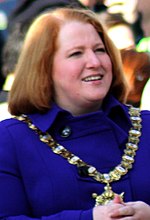Alliance Party of Northern Ireland
| Alliance Party of Northern Ireland | |
|---|---|

|
|

|
|
| Party leader | Naomi Long |
| founding | April 21, 1970 |
| Headquarters | 88 University Street Belfast Northern Ireland |
| Youth organization | Young Alliance |
| Alignment |
Liberalism Interdenominationalism |
| Colours) |
Yellow black blue |
| British House of Commons |
1/650 |
| Northern Ireland Assembly |
8/90 |
|
Local government in Northern Ireland |
32/462 |
| International connections | Liberal International (LI) |
| European party | ALDE (associated) |
| Website | allianceparty.org |
The Alliance Party of Northern Ireland ( Alliance ) is a non-denominational and liberal regional party in Northern Ireland .
Party history and development
The Alliance Party of Northern Ireland was founded in 1970 at a height of the Northern Ireland conflict with the aim of establishing a non-denominational political party on the hardened fronts in Northern Ireland. The party supports the union with Great Britain as long as the majority of the population agrees. The party also stands for formal ties between Northern Ireland and the Republic of Ireland . The Alliance Party was involved in the negotiations for the Good Friday Agreement and campaigned for approval in the subsequent referendum .
In British politics, the party is based on the Liberal Democrats , on the international level it is a member of the Liberal International and an associated member of the ALDE party . The party relies on long-term trends, on the one hand on the fact that voters will increasingly orientate themselves less and less on religious or denominational ties in their voting decisions in the future and on the other hand that there will be more and more voters who come from cultures outside Northern Ireland or even come from Europe (e.g. immigrants from the Commonwealth ) who do not feel addressed by the regional confessional parties.
With Anna Lo , a native of China entered a European Parliament for the first time in the 2007 elections. The Hong Kong- born MP has her constituency in the south of the capital, Belfast . In the 2003 elections to the Northern Ireland Assembly , the party hit a temporary low with just 3.7% of the vote and 6 out of 108 seats. Since then she has been able to slowly increase the share of votes and mandates again. In the British general election on May 6, 2010 , the Alliance won with Naomi Long for the first time a seat in Parliament in Westminster. In her constituency, Belfast East, Long defeated First Minister for Northern Ireland, Peter Robinson of the Democratic Unionist Party , who had held the mandate there since 1979, but was afflicted by an affair. The mandate was lost again in the following general election in 2015 . In the May 2016 election for the Northern Ireland Assembly , the Alliance received 7.0% of the vote and eight seats. In the early election of the Northern Ireland Assembly in 2017 , the Alliance won 9.1% of the vote, their best result since 1998. In the 2019 general election , the Alliance won another mandate with the constituency North Down and was able to significantly increase its share of the vote in the context of the “Brexit” debates.
The Alliance was represented for a long time as the only non-denominational party in the Northern Irish government, where it provided the Minister of Justice with party chairman David Ford and the Minister for Labor and Learning with Stephen Farry . After the election for the Northern Ireland Assembly in 2016 , the party decided not to participate in the government on the grounds that, as a coalition partner, it could not sufficiently implement its political goals.
Party leader
- Oliver Napier (1972-1984)
- John Cushnahan (1984-1987)
- John Alderdice (1987-1998)
- Seán Neeson (1998-2001)
- David Ford (2001-2016)
- Naomi Long (since 2016)
Election results
The election results in the following table refer to Northern Ireland (also for the all-British elections). General elections were carried out consistently by majority voting , elections to the Northern Ireland Assembly from 1998 and elections to the European Parliament by preferential suffrage .
Web links
Individual evidence
- ^ NI Executive: Alliance Party ruling council endorses justice ministry decision. BBC News, May 20, 2016, accessed February 22, 2017 .
- ↑ Who Won What When and Where? ark.ac.uk (Nicholas Whyte), January 1, 2015, accessed March 8, 2015 .
- ↑ Martin Melaugh, Fionnuala McKenna: CAIN Web Service: Results of Elections Held in Northern Ireland Since 1968. cain.ulst.ac.uk, February 9, 2014, accessed on March 8, 2015 .
- ↑ European election 2009. BBC News, June 14, 2004, accessed March 8, 2015 .
- ↑ European election 2009. BBC News, June 8, 2009, accessed March 8, 2015 .
- ↑ European election 2009. BBC News, May 27, 2014, accessed March 8, 2015 .

